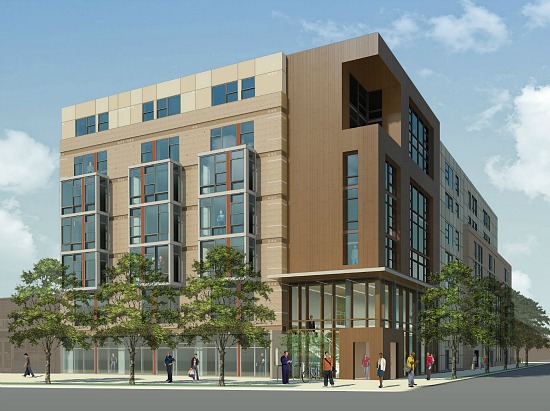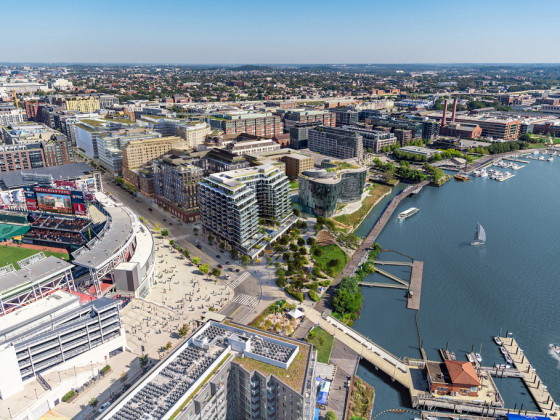What's Hot: Did January Mark The Bottom For The DC-Area Housing Market? | The Roller Coaster Development Scene In Tenleytown and AU Park
 Does DC Have a Housing Strategy?
Does DC Have a Housing Strategy?
✉️ Want to forward this article? Click here.

The Avenue at Park Morton, a residential project with affordable units on Georgia Avenue.
On Monday night, Mayor Gray’s Comprehensive Housing Strategy Task Force held a public hearing to gather ideas about the state of housing in the city.
The forum focused largely on supporting affordable housing measures, a topic that has become more pertinent as DC develops and prices and rents continue to rise. Many who spoke encouraged the city to support seniors, veterans, the disabled and the working poor who have been living in DC all their lives but find themselves struggling to afford a home.
Dozens of speakers showed up, many who were residents that had been assisted by various programs and non-profits. They were joined by non-profit employees who shared their perspective on the city’s various housing programs.
Here are a few of the ideas that emerged:
- Area Median Income (AMI) is an imperfect measure. — Misty Thomas, an attorney with the Washington Legal Clinic for the Homeless, warned the city about depending on AMI — a measure that includes the surrounding suburbs — to determine who is and isn’t eligible for certain housing situations. “80 percent AMI [a common upper limit for those eligible for affordable units] is not truly affordable housing,” said Thomas. “There are people who are part of the city workforce but don’t make anywhere near 80 percent AMI.”
- The Housing Production Trust Fund (HPTF) needs support. — Several speakers praised the HPTF, a program designed to produce and preserve affordable housing. “The Housing Production Trust Fund is critical,” said Heather Crouch of Mi Casa. Recent budgets have significantly cut funding for HPTF, and several speakers encouraged the city to support it once again. The fund can be used for things like rehabbing dilapidated buildings, and assisting residents with programs like the Tenant Opportunity to Purchase Act (TOPA), which helps maintain mixed-income neighborhoods.
- The city’s focus on job growth is a good long-term strategy, but limited in the short-term. — DC has been concentrating its efforts on job growth as a long-term strategy to solving the affordable housing issue. The task force pointed out that when residents move from 30 to 50 percent AMI, they have access to a significantly greater portion of the city’s housing stock. However, residents who need help now are feeling neglected, said Thomas. “How can we advocate for affordable housing in 2013?” she asked.
- Inclusionary Zoning (IZ) needs to be managed more carefully. — Inclusionary zoning mandates that each new residential development must set aside a certain percentage of units as affordable. Many speakers on Monday night mentioned that DC’s IZ program needs to be managed more carefully, and some spoke with skepticism about the strategy itself. Sarah Scruggs of Manna was concerned for residents who buy these units who are unaware of the resale restrictions that limit the amount of equity that can be gained from the purchase. “Homeowners purchase restricted units unaware of the consequences,” said Scruggs. “They don’t know that they will be social pariahs in the building, that condo fees will go up and that resale restrictions will literally trap them in their units.” Others encouraged DC to look to other jurisdictions that have managed IZ programs successfully.
Monday’s discussion was just the start of the task force’s effort to take a closer look at housing in DC. A second public hearing will be held on November 14th, location to be determined.
Similar Posts:
- Gentrification in DC: Five Takeaways From a Recent Forum
- Gentrification, Schools and Affordable Housing: What Does the Community Think?
This article originally published at https://dc.urbanturf.com/articles/blog/does_dc_have_a_housing_strategy/6196.
Most Popular... This Week • Last 30 Days • Ever

As mortgage rates have more than doubled from their historic lows over the last coupl... read »

Lincoln-Westmoreland Housing is moving forward with plans to replace an aging Shaw af... read »

The small handful of projects in the pipeline are either moving full steam ahead, get... read »

The longtime political strategist and pollster who has advised everyone from Presiden... read »

A report out today finds early signs that the spring could be a busy market.... read »
DC Real Estate Guides
Short guides to navigating the DC-area real estate market
We've collected all our helpful guides for buying, selling and renting in and around Washington, DC in one place. Start browsing below!
First-Timer Primers
Intro guides for first-time home buyers
Unique Spaces
Awesome and unusual real estate from across the DC Metro














